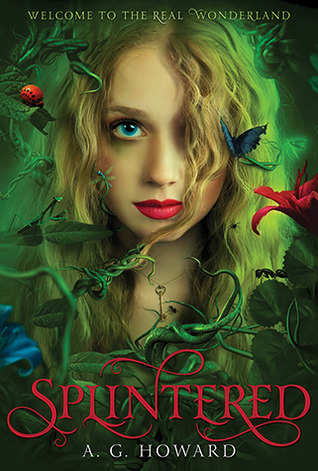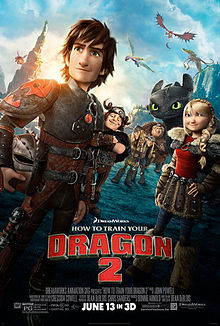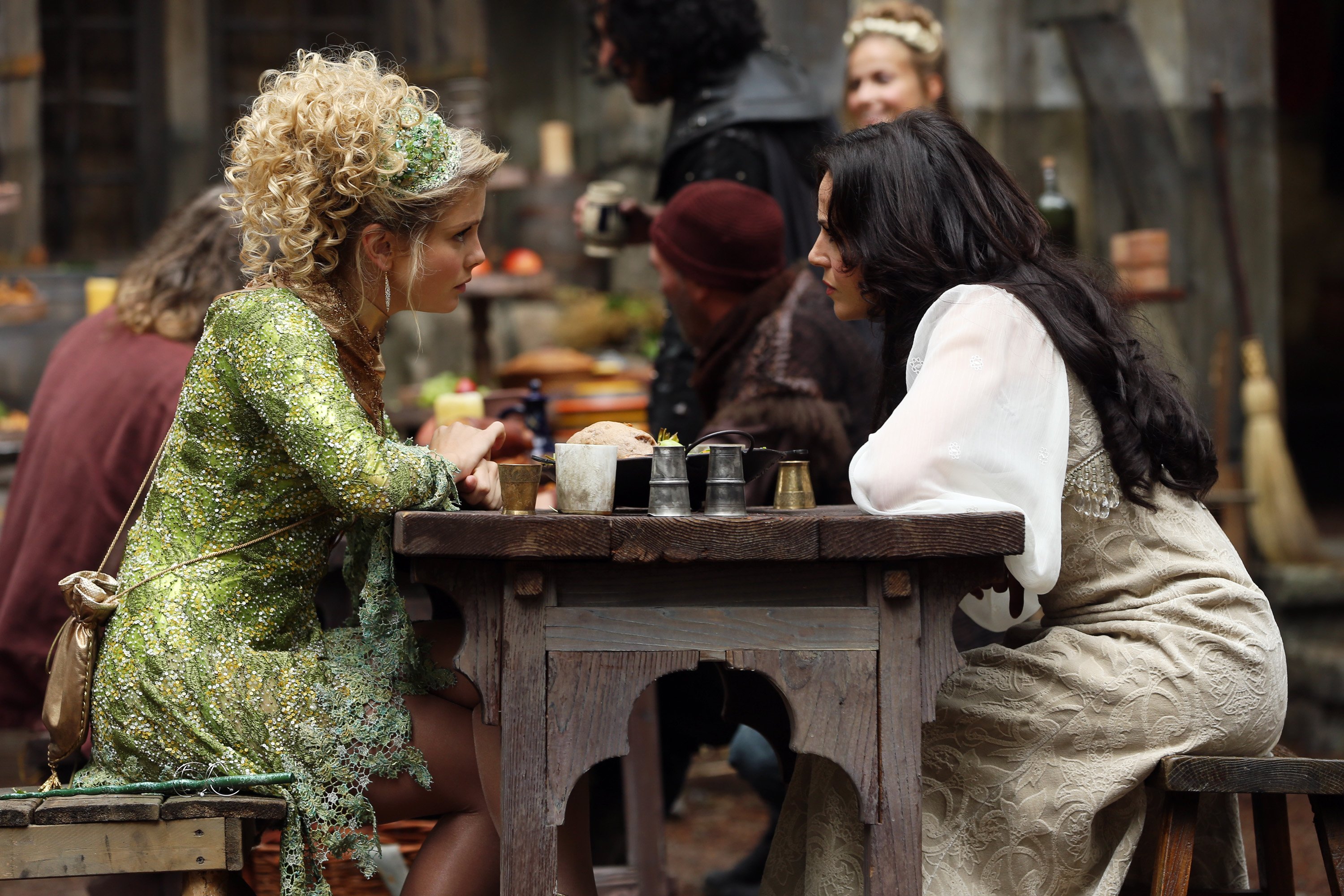Once Upon a Time Season 3 Episode 3: "Quite a Common Fairy"
In the fairyback, Regina, newly married to Snow's father, leads a sorrowful existence. While Rumpel instructs her to channel her anger into her magic, Regina instead thinks of suicide. When a bannister falls away and Regina plummets to her death (deliberate or not), a fairy appears and rescues her. The fairy, Tinkerbell, goes with Regina to a pub, where Regina talks about the problems in her life. Tinkerbell, certain that all Regina needs is to find happiness again, promised to help her. Upon returning to the fairies' dwelling, however, the Blue Fairy commands Tinkerbell to abandon the endeavor, claiming that Regina is beyond help and in the grasp of Cora and Rumpel. This only serves to convince Tinkerbell all the more that Regina needs her help.
That night, Tinkerbell steals pixie dust from the fairies and goes to Regina's room, where she sprinkles it on her. The two fly away, following a trail of green dust to Regina's soulmate. The dust leads them to a tavern; Tinkerbell goes inside first to determine who the dust indicates, and returns to Regina, telling her to speak to the man with the lion tattoo on his arm. Tinkerbell then flies away, leaving Regina to her future happiness. However, Regina panics and runs away without ever entering the tavern, let alone speaking to the man.
Arriving back at the fairies' dwelling, Tinkerbell is chastised by the Blue Fairy, who is aware of all Tinkerbell did. Tinkerbell argues that they were taught to believe in second chances, but the Blue Fairy counters that this was Tinkerbell's second chance before stripping her of her wings and magic.
In Neverland, the narrative is split between Henry and the group searching for him. Henry is forced to play William Tell by Pan and his Lost Boys. He expects to be the "victim," but instead is given a crossbow and told to fire the apple off another boy's head. Instead, Henry fires at Pan, who catches the arrow. Pan then explains that he's been waiting for Henry since he was born, as Henry is the only one with a strong enough belief in magic to restore it to the dying lands. Henry argues that Emma is the savior, but Pan explains that she is only such for having birthed Henry, a child equally of light and darkness. He then gives Henry a slip of paper, upon which is a drawing of Henry with the caption "The truest believer", seemingly drawn long before Henry was born.
As the group searches for Henry, they realize that his location on the map has changed, indicating that Pan's camp is on the move. Hook suggests finding Tinkerbell, whom he has worked with in the past, and asking for her help. All but Regina are in agreement. Regina tries to convince Emma to combine their magic and attack Pan head-on, but Emma refuses, fearing for Henry's safety. The group press on, with Regina hanging toward the back. She drops her handkerchief, which is picked up by someone who apparently is tracking them.
Hook pulls David aside, and the two discuss his wound. With only weeks to live at most, Hook advises David to tell Snow, but David does not, believing if they find Tinkerbell and her pixie dust that he will be cured.
Having reached Tinkerbell's home, Regina remains behind, stating that she's sure Tinkerbell will refuse to help if she knows Regina is with them. As the rest of the group moves on, Regina waits on a log and is soon after knocked out with poppy dust by noneother than Tinkerbell. Finding her house empty, the others return to find Regina missing, only her handkerchief left behind.
Tinkerbell holds Regina at spearpoint, demanding to know why she lied about the pixie dust failing to work all those years ago. Regina admits that she was afraid to enter the tavern, and Tinkerbell explains that because of her she lost all of her magic. Regina removes her own heart, showing Tinkerbell how black it has become. She explains that if Tinkerbell kills her, Tink will be no different than her and her own heart will grow black. But if Tinkerbell helps her to find Henry, she will be the good fairy she always wanted to be. Tinkerbell returns Regina's heart, but refuses to help. At that point, the others find them and convince Tinkerbell to help, although they are disappointed to learn that she is human. As they resume their trek, Tinkerbell tells Regina that she didn't just ruin her own life by not entering the tavern but the life of the man with the lion tattoo, as well.
Meanwhile, in the Enchanted Forest, Neal searches madly for a magic device that can lead him to Neverland, certain that something has happened to Henry. Robin Hood's band of Merry Men enter the room, along with Robin's son, Roland, and Neal realizes that Roland is the key to Neverland. After convincing Robin that his plan will not endanger Roland in any way, Robin reluctantly agrees. Robin, Neal, and Mulan hide behind various pieces of furniture, while Roland stands at the window and says, "I believe." After nothing happens immediately, Neal asks Roland to say it again, but Robin reminds him that the deal was for him to say it only once. Suddenly, the shadow appears to take Roland to Neverland. Mulan stabs it and pulls Roland to safety, as Neal lunges at its foot and it taken to Neverland.
Robin invites Mulan to join his Merry Men, impressed by her tactical skill, but she says there is someone she must speak with first. Remembering how Neal regretted not having told Emma he loved her, Mulan resolves to tell her special someone. Returning to Aurora's palace, she says that there is something she must tell her; Aurora also tells her she has news to share. Letting Aurora tell first, Mulan is stunned to learn that Aurora is pregnant. Visibly upset, Mulan tells Aurora that she will be joining the Merry Men, rather than confessing her unrequited feelings. Returning to Rumpel's castle, Mulan is welcomed by Robin, who is the man with the lion tattoo.
I was so glad that Regina received some much needed character development this episode! It was a great move to explain her motivations for becoming a villain and her fears of remaining unloved and alone. I felt this was something most people could relate to, and it really served to humanize Regina, who for so much of the series has been unjustly considered "evil." The one thing this show consistently does well is to create sympathetic villains, characters who are truly grey. I wish the same could be said of the heroes.
Speaking of which, the Blue Fairy demonstrates once again that good simply means self-righteous blowhard in the world of
Once Upon a Time. I found utterly ridiculous that Tinkerbell was chastised for attempting to help someone who quite obviously was in need of help simply because of said person's associates. And, of course, for Tinkerbell to have been punished as she was just serves to emphasize that sometimes the real villains are those professing to do good. Unfortunately, I think the writers are unaware of this since all of their supposed "good" characters are written in this way.
Tinkerbell, as she was portrayed in the fairybacks, is the closest example of true good yet to be seen on the show. Someone who genuinely wants to help all people, regardless of their past deeds or associates. And, while I enjoyed the jaded Tink in Neverland, I really hope that something along her journey inspires her to return to being the idealistic person she was.
I have seen numerous articles popping up about Mulan's sexuality, and while I applaud the portrayal of a character outside of hetero-normative behavior on a so-called family program, I think it was too easy to insert queerness into Mulan. Perhaps it's even expected. While other female characters on the show have shown battle prowess, none of them wore men's armor or served in the military, so there is already an expectation that Mulan is somehow "other." And, yes, her appearance on the show is more feminine than that of the film, but we never see her in any other garb. I think it would have sent a stronger message of acceptance to have outed an overtly feminine character, a princess type. And it would be even more powerful to have her love returned. While I enjoy drama as much as the next person, this smacked a bit too much of the tragic lesbian novels written in the mid-twentieth century. This show has claimed time and again that everyone deserves a happy ending, even Rumpel, even Regina. So what about Mulan? I hope she finds her happy ending by series end, regardless of where her new lover falls on the spectrum. Ideally, though, the person will not be a cis-man, as that would be back-pedaling, and Mulan deserves better. Once outed, she should remain so.
My only real complaint with this episode was that, once again, the writers are rushing things by having Neal reach Neverland already. While I'm excited to see what transpires with Neal returning to a place from which he fought so hard to escape, I wish the writers would pace themselves. I don't want Henry to be rescued by mid-season and a new evil come forth, like last season with Cora and the mundies. I know that mainstream audience's have terrible attention spans, and the producers and writers want the show to remain accessible to the lowest common denominator, but I think slowing down a tiny bit wouldn't be that detrimental to the audience-at-large and would be a great help to show.
I apologize if I sounded a bit ranty this week. It was a good episode (one of the better ones without Rumpel), and I think it made a good deal of progress with some of the characters who typically don't get the attention they deserve.
















